
Top stories





Marketing & MediaWarner Bros. was “nice to have” but not at any price, says Netflix
Karabo Ledwaba 2 days

More news

Logistics & Transport
Maersk reroutes sailings around Africa amid Red Sea constraints












Sustainable Development Goal 7, ‘Affordable and clean energy’, is all about ensuring access to affordable, reliable, sustainable and modern energy for all. This SDG calls for universal access to modern energy services, improving energy efficiency and increasing the share of renewable energy. To accelerate the transition to an affordable, reliable and sustainable energy system that fulfils these demands, countries need to facilitate access to clean energy research and technology and to promote investment in resource and energy-efficient solutions and low-carbon energy infrastructure.
Below is an overview of the status of SDG 7 published by the United Nations in their ‘Sustainable Development Goals Report 2021’.
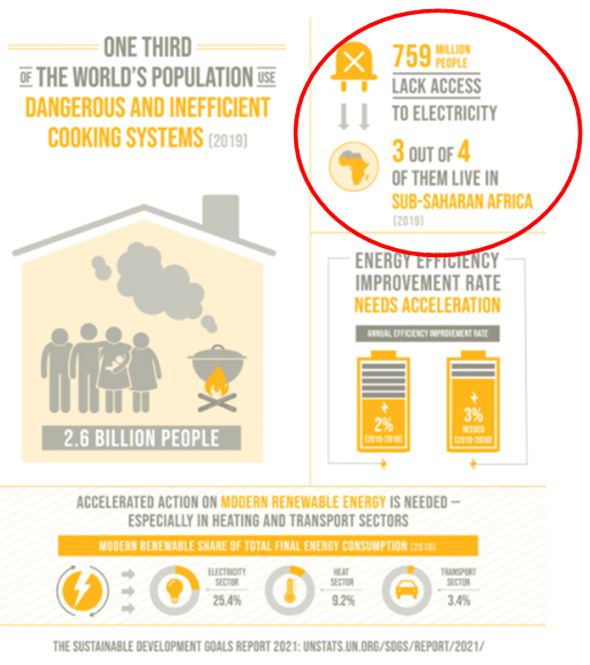
There are five focus areas for this SDG which I’ll discuss in this article. These are:
Access to electricity
In 2019, 85% of South Africa’s population had access to electricity, with this being worse for people living in rural areas (79%) as compared to people living in urban areas (88%). The International Energy Association’s October 2020 Flagship Report titled ‘SDG 7: Data and Projections’ states that the number of people without access to electricity is set to increase again in 2020 after six years of decline in Africa. In order to avoid this increase, we need to put access to electricity for all at the heart of our plans.
Strong policy support and an increase in international funding will also go a long way towards ensuring our success in this area. We need to look at how we can improve our electricity networks through smart and efficient integrated delivery programmes.
Decentralised solutions, for example, can be a game changer for the many people who still do not have access to electricity. According to the report: "Decentralised solutions are the least-cost way to provide power to more than half of the population gaining access by 2030." These solutions can be implemented in addition to increasing grid-connected electricity generated from renewables. These involve for example, small-scale solar photovoltaic (PV) for standalone systems and mini-grids which are now becoming key in helping to deliver affordable electricity.
Access to clean cooking
14% of South Africa’s population does not have access to clean cooking facilities. Instead they rely on gathering biomass, or using kerosene or coal, as their primary cooking fuel. The International Energy Association (IEA) tells us that current policies are far from sufficient to achieve universal access by 2030. Globally, household air pollution, mostly cooking smoke, is linked to around 2,5 million premature deaths annually, with women and children being the worst affected. Forest degradation, sometimes leading to deforestation, is another serious consequence of the unsustainable harvesting of firewood.
Shifting government priorities and supply chain disruptions have impacted negatively on the progress that was being made in this area. To support continued access to energy services, some countries have been moving forward quickly. Uganda, for example, removed value-added tax on liquefied petroleum gas (LPG) in June 2020, and the government in India guaranteed free LPG refills for their poor between April and September 2020.
Achieving this target will require effective programmes that support affordable solutions for the poorest households and the deployment of efficient infrastructure. LPG and improved cookstoves are scalable solutions and there are also alternative fuels that could be deployed for cooking such as biogas and bioethanol. Electric pressure cookers powered by solar PV and a battery could be cost effective solution that will not overburden distribution grids.
Renewable energy
In 2018, South Africa’s share of renewable energy in its total final energy consumption was 10.3%. At a global level, the growth of renewables has outpaced the rate of increase of energy consumption. The IEA tells us that the contribution of solar PV to the expansion of renewables-based electricity has been especially strong over the last three years.
South Africa is in the fortunate position to have excellent solar and wind resources available. Our country’s investments into renewable technologies such as PV systems, concentrated power plants and wind turbines have increased significantly since 2012. However, there is still a long way to go towards meeting South Africa’s renewable energy targets. By introducing renewable energy technologies into your home or office, you can play a key part in helping to grow the renewable energy market in South Africa. This, in turn, will stimulate economic growth and job creation. As a country, we can localise the renewable energy value chain and effectively re-skill our workforce.
Energy efficiency
The 2030 target for this area of SDG7 is to double the global rate of improvement in energy efficiency. ‘Energy intensity’ is the indicator used to track energy efficiency and is defined as the ratio of primary energy supply to GDP.
According to the IEA, global energy intensity must improve by 2,9% annually to reach the target. Meeting this objective will require an important step up in the implementation and expansion of energy efficiency policies. These policies include minimum energy performance standards, fuel-economy standards, building energy codes and industry targets and should be complemented by fiscal and financial incentives in order to accelerate their implementation.
International financial flows
International financial flows represent the international public aid in support of clean and renewable energies to developing countries. In 2018, South Africa received international financial flows in support of clean and renewable energy of $359 million. Increasing the international financial flows to South Africa will significantly help our country to increase its clean energy research and development and its renewable energy implementation and production.
Meeting the goal of ensuring access to affordable, reliable, sustainable and modern energy for all requires:
South Africa has significant potential to save money through energy efficiency and to increase the share of renewable energy in its energy mix.
As Bill Gates says in How to avoid a climate disaster: "Everyone deserves the chance to live a healthy and productive life – it’s hard to stay healthy if your local medical clinic can’t keep vaccines cold because the refrigerators don’t work. It’s hard to be productive if you don’t have lights to read by. And it’s impossible to build an economy where everyone has job opportunities if you don’t have massive amounts of reliable, affordable electricity for your offices, factories, and call centres."
#SustainableSA, join the journey.
Appendix 1
SDG 7 (‘Ensure access to affordable, reliable, sustainable and modern energy for all’) has five targets and eleven indicators.
Target Indicator
7.1 By 2030, ensure universal access to affordable, reliable and modern energy services
7.1.1 Proportion of population with access to electricity
7.1.2 Proportion of population with primary reliance on clean fuels and technology
7.2 By 2030, increase substantially the share of renewable energy in the global energy mix
7.2.1 Renewable energy share in the total final energy consumption
7.3 By 2030, double the global rate of improvement in energy efficiency
7.3.1 Energy intensity measured in terms of primary energy and GDP
7.a By 2030, enhance international cooperation to facilitate access to clean energy research and technology, including renewable energy, energy efficiency and advanced and cleaner fossil-fuel technology, and promote investment in energy infrastructure and clean energy technology
7.a.1 International financial flows to developing countries in support of clean energy research and development and renewable energy and production, including hybrid systems
7.b By 2030, expand infrastructure and upgrade technology for supplying modern and sustainable energy services for all in developing countries, in particular least developed countries, small island developing states and land-locked developing countries, in accordance with their respective programmes of support
7.b.1 Investments in energy efficiency as a percentage of GDP and the amount of foreign direct investment in financial transfer for infrastructure and technology to sustainable development services
Appendix 2
Other linked SDG targets and indicators:
SDG 3 ‘Ensure healthy lives and promote wellbeing for all at all ages’ (Target 3.9).
Target Indicator
3.9 By 2030, substantially reduce the number of deaths and illnesses from hazardous chemicals and air, water and soil pollution and contamination
3.9.1 Mortality rate attributed to household and ambient air pollution
SDG Target 11.6.2: Make cities and human settlements inclusive, safe, resilient and sustainable
11.6 By 2030, reduce the adverse per capita environmental impact of cities, including by paying special attention to air quality and municipal and other waste management
11.6.2 Annual mean levels of fine particulate matter (eg PM 2,5 and PM 10) in cities (population weighted)
SDG 12 ‘Responsible consumption and production’ (Target 12.c):
Target Indicator
12.c Rationalise inefficient fossil-fuel subsidies that encourage wasteful consumption by removing market distortions, in accordance with national circumstances, including by restructuring taxation and phasing out those harmful subsidies, where they exist, to reflect their environmental impacts, taking fully into account the specific needs and conditions of developing countries and minimising the possible adverse impacts on their development in a manner that protects the poor and affected communities.
7.b.1 Amount of fossil-fuel subsidies per unit of GDP (production and consumption) and as a proportion of total national expenditure on fossil fuels
SDG 13 ‘Take urgent action to combat climate change and its impacts’ (Target 13.2.1)
13.2 Integrate climate change measures into national policies, strategies and planning
13.2.1 Number of countries that have communicated the establishment or operationalisation of an integrated policy/strategy/plan which increases their ability to adapt to the adverse impacts of climate change and foster climate resilience and low greenhouse gas emissions development in a manner that does not threaten food production (including a national adaptation plan, nationally determined contribution, national communication, biennial update report or other)
Appendix 3
South Africa’s progress on SDG 7 provided by the Energy Sector Management Assistance Programme.
Access to electricity
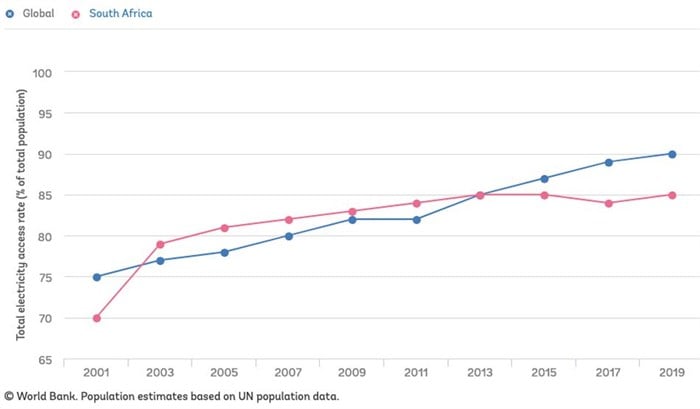
In 2019 85% of South Africa’s population had access to electricity. Access to electricity was worse for those living in rural areas (79%) as compared to those living in urban areas (88%).
Access to clean cooking
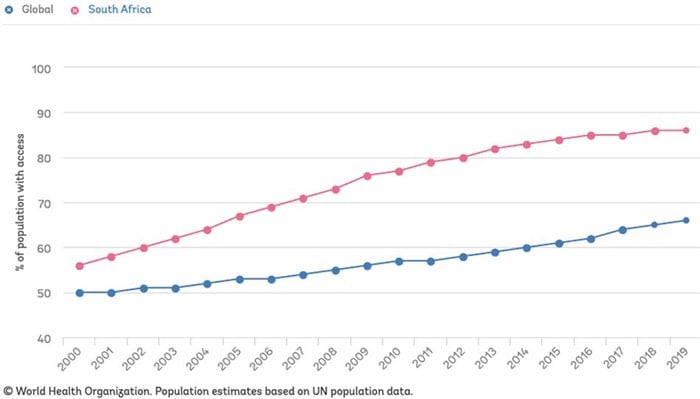
In 2019 the clean cooking access rate for South Africa was 86%. The access rate was worse for those living in rural areas (65%) as compared to those living in urban areas (95%).
Renewable energy

In 2018 South Africa’s share of renewable energy in its total final energy consumption was 10.3%.
Energy efficiency
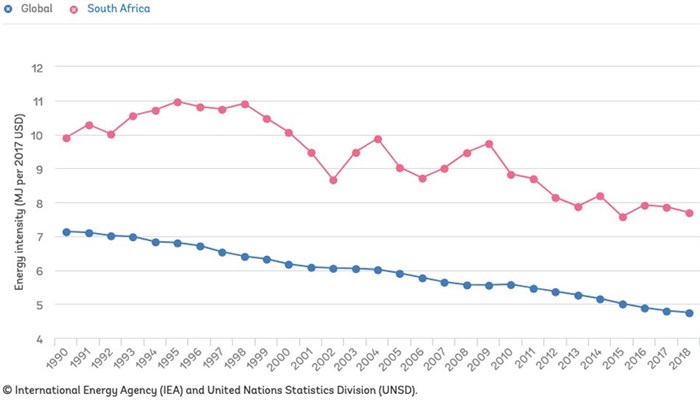
Energy efficiency is calculated by dividing the energy obtained (useful energy or energy output) by the initial energy (energy input). In 2018 South Africa had an energy efficiency of 7.7 MJ per a purchasing power parity of the 2017 USD.
International financial flows
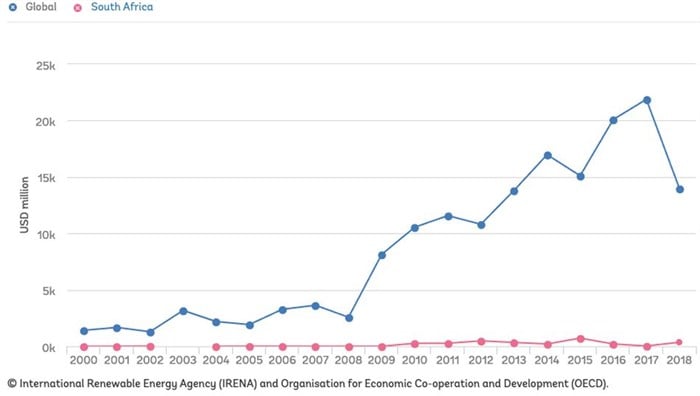
In 2018 South Africa received international financial flows in support of clean and renewable energy of $359 million.